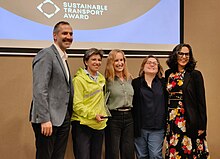
Smart growth is an urban planning and transportation theory that concentrates growth in compact walkable urban centers to avoid sprawl. It also advocates compact, transit-oriented, walkable, bicycle-friendly land use, including neighborhood schools, complete streets, and mixed-use development with a range of housing choices. The term "smart growth" is particularly used in North America. In Europe and particularly the UK, the terms "compact city", "urban densification" or "urban intensification" have often been used to describe similar concepts, which have influenced government planning policies in the UK, the Netherlands and several other European countries.
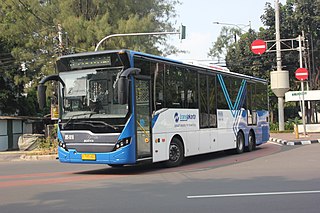
Bus rapid transit (BRT), also referred to as a busway or transitway, is a trolleybus, electric bus and public transport bus service system designed to have much more capacity, reliability, and other quality features than a conventional bus system. Typically, a BRT system includes roadways that are dedicated to buses, and gives priority to buses at intersections where buses may interact with other traffic; alongside design features to reduce delays caused by passengers boarding or leaving buses, or paying fares. BRT aims to combine the capacity and speed of a light rail transit (LRT) or mass rapid transit (MRT) system with the flexibility, lower cost and simplicity of a bus system.

TransMilenio is a bus rapid transit (BRT) system that serves Bogotá, the capital of Colombia, and Soacha, a neighbouring city. The system opened to the public in December 2000. As of 2024, 12 lines totalling 114.4 km (71 mi) run throughout the city. It is part of the city's Integrated Public Transport System, along with the urban, complementary and special bus services operating on neighbourhood and main streets.
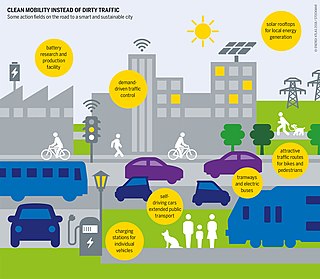
Sustainable transport refers to ways of transportation that are sustainable in terms of their social and environmental impacts. Components for evaluating sustainability include the particular vehicles used for road, water or air transport; the source of energy; and the infrastructure used to accommodate the transport. Transport operations and logistics as well as transit-oriented development are also involved in evaluation. Transportation sustainability is largely being measured by transportation system effectiveness and efficiency as well as the environmental and climate impacts of the system. Transport systems have significant impacts on the environment, accounting for between 20% and 25% of world energy consumption and carbon dioxide emissions. The majority of the emissions, almost 97%, came from direct burning of fossil fuels. In 2019, about 95% of the fuel came from fossil sources. The main source of greenhouse gas emissions in the European Union is transportation. In 2019 it contributes to about 31% of global emissions and 24% of emissions in the EU. In addition, up to the COVID-19 pandemic, emissions have only increased in this one sector. Greenhouse gas emissions from transport are increasing at a faster rate than any other energy using sector. Road transport is also a major contributor to local air pollution and smog.
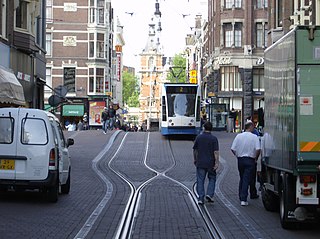
In urban planning, transit-oriented development (TOD) is a type of urban development that maximizes the amount of residential, business and leisure space within walking distance of public transport. It promotes a symbiotic relationship between dense, compact urban form and public transport use. In doing so, TOD aims to increase public transport ridership by reducing the use of private cars and by promoting sustainable urban growth.

A living street is a street designed with the interests of pedestrians and cyclists in mind by providing enriching and experiential spaces. Living streets also act as social spaces, allowing children to play and encouraging social interactions on a human scale, safely and legally. Living streets consider all pedestrians granting equal access to elders and those who are disabled. These roads are still available for use by motor vehicles; however, their design aims to reduce both the speed and dominance of motorized transport. The reduction of motor vehicle dominance creates more opportunities for public transportation.

Transportation Alternatives is a non-profit organization in New York City which works to change New York City's transportation priorities to encourage and increase non-polluting, quiet, city-friendly travel and decrease automobile use. TransAlt seeks a transportation system based on a "Green Transportation Hierarchy" giving preference to modes of travel based on their relative benefits and costs to society. To achieve these goals, T.A. works in five areas: Cycling, Walking and Traffic Calming, Car-Free Parks, Safe Streets and Sustainable Transportation. Promotional activities include large group bicycle rides.
The term "sustainable communities" has various definitions, but in essence refers to communities planned, built, or modified to promote sustainable living. Sustainable communities tend to focus on environmental and economic sustainability, urban infrastructure, social equity, and municipal government. The term is sometimes used synonymously with "green cities," "eco-communities," "livable cities" and "sustainable cities."

ICLEI – Local Governments for Sustainability is an international non-governmental organization that promotes sustainable development. ICLEI provides technical consulting to local governments to identify and meet sustainability objectives. It has a strong focus on biodiversity and has worked across local, national, and global levels. ICLEI was the first and is the largest transnational network of local governments engaging in climate action.

Complete streets is a transportation policy and design approach that requires streets to be planned, designed, operated and maintained to enable safe, convenient and comfortable travel and access for users of all ages and abilities regardless of their mode of transportation. Complete Streets allow for safe travel by those walking, cycling, driving automobiles, riding public transportation, or delivering goods.

Established alternatives to car use include cycling, walking, kick scooters, rollerblading, skateboarding, twikes and motorcycles. Other alternatives are public transport vehicles.

In urban planning, walkability is the accessibility of amenities by foot. It is based on the idea that urban spaces should be more than just transport corridors designed for maximum vehicle throughput. Instead, it should be relatively complete livable spaces that serve a variety of uses, users, and transportation modes and reduce the need for cars for travel.

Active mobility, soft mobility, active travel, active transport or active transportation is the transport of people or goods, through non-motorized means, based around human physical activity. The best-known forms of active mobility are walking and cycling, though other modes include running, rowing, skateboarding, kick scooters and roller skates. Due to its prevalence, cycling is sometimes considered separately from the other forms of active mobility.

The Institute for Transportation and Development Policy (ITDP) is a non-governmental non-profit organization that focuses on developing bus rapid transit (BRT) systems, promoting biking, walking, and non-motorized transport, and improving private bus operators margins. Other programs include parking reform, traffic demand management, and global climate and transport policy. According to its mission statement, ITDP is committed to "promoting sustainable and equitable transportation worldwide."

Walter B. Hook is an urban planner and expert in the field of sustainable transportation policy and practice. Since 2015, Dr. Hook has been a Principal at BRT Planning International, LLC, a boutique BRT planning firm. From 1993 until 2014, Hook worked as the Chief Executive Officer for the Institute for Transportation and Development Policy (ITDP), a nonprofit agency that promotes environmentally sustainable and equitable transportation policies and projects in the developing world. Under the auspices of ITDP, Hook worked on the design and implementation of numerous bus rapid transit (BRT) systems in Asia, Africa, and Latin America, and is considered a leading expert on BRT design and policy. He collaborated extensively with Enrique Peñalosa, former mayor of Bogotá, Colombia, and creator of the TransMilenio, one of the world's premier BRT systems. Additionally, Hook has campaigned for sustainable transport and urban planning practices in the U.S.
Michael Replogle is an internationally recognized expert and advisor in the field of sustainable transport. He co-founded the Institute for Transportation and Development Policy (ITDP) in 1985, a nonprofit organization that promotes environmentally sustainable and equitable transportation projects and policies worldwide, as well as Bikes Not Bombs in 1984. He was the president of ITDP from 1985–1992 and 1998-2009, and managing director of ITDP from 2009-2015. His seminal 1987 paper on sustainable transport was the first to define the term. In 2024, his expert testimony led to a pathbreaking settlement of a lawsuit between Hawai'i Department of Transportation and 13 youth plaintiffs, represented by Our Children's Trust and Earthjustice, for a statewide plan to decarbonize transportation by 2045, achieving a 50% reduction by 2030, with 5-year targets and annual reporting.
OpenPlans is a non-profit that advocates for making the streets of New York City livable for all residents. Open Plans uses tactical urbanism, grassroots advocacy, policy and targeted journalism to promote structural reforms within city government that support livable streets, neighborhoods and the city-at-large. The organization was founded in 1999 by Mark Gorton, the creator of LimeWire.
Tiruchirappalli BRTS is a proposed bus rapid transit system for the city of Tiruchirappalli.
Tiruchirappalli Bicycle Share is a new proposed bicycle sharing system for the city of Tiruchirappalli.
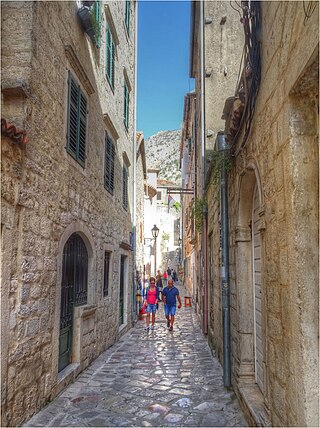
A walking city or walkable city is a type of city that is created to avoid internal transportation, and therefore be small enough that a person can use walking to navigate the city. It is characterized by narrow, often winding streets. Its transport system is inherently egalitarian, with no one being disadvantaged by a lack of transport, unlike modern automotive cities. Walkability within areas positively impacts equity, sustainability, health, social benefits, less demand on other modes, economic development, and enjoyment.

